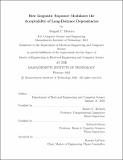How Linguistic Exposure Modulates the Acceptability of Long-Distance Dependencies
Author(s)
Bertics, Abigail C.
DownloadThesis PDF (2.390Mb)
Advisor
Berwick, Robert C.
Gibson, Edward
Terms of use
Metadata
Show full item recordAbstract
A central and still contested question in linguistics is “What makes a sentence good?” This thesis looks into one possible answer: the more you hear it, the better it sounds. More specifically, we are investigating what influences the acceptability of a certain type of long-distance, so-called ‘filler-gap’ dependency: object-extracted wh-question islands. We take a two-pronged approach. First, we look into how long-term, lifetime exposure to various components of a sentence (estimated from corpora) impacts its acceptability. We find support for the verb-frame frequency hypothesis (VFF; Liu et al. 2021a) and find that the frequency of the matrix-verb frame and the construction type in particular have statistically significant effects on acceptability ratings. It remains an open question how the individual components of a sentence combine to result in a single sentence acceptability judgement. The second prong takes partial inspiration from the mere-exposure effect in psychology (Zajonc, 1968). We investigate how short-term, within-experiment exposure to matrix-verb frame and construction type (the two components that influence overall sentence acceptability) affects the acceptability rating. Although no experimentally robust effect of short-term exposure, or priming, was found, we found a small, but statistically significant effect of order; acceptability ratings increase over the course of the experiment. Amazon Mechanical Turk (mTurk), used judiciously and with proper exclusion protocols, is a robust and powerful tool that is not worse than in-person experiments (Crump et al., 2013; Thomas and Clifford, 2017). Whether this small effect is happenstance or holds more generally has yet to be determined, but it should serve as a cautionary tale about running experiments where the incentive of the participants (e.g., to finish the task as quickly as possible to still get paid) and what the researcher is trying to study (e.g., how the human mind processes language) do not necessarily align.
Date issued
2022-02Department
Massachusetts Institute of Technology. Department of Electrical Engineering and Computer SciencePublisher
Massachusetts Institute of Technology